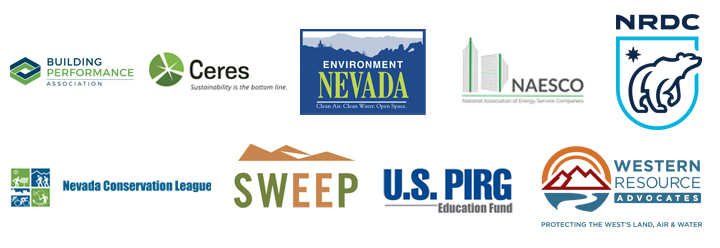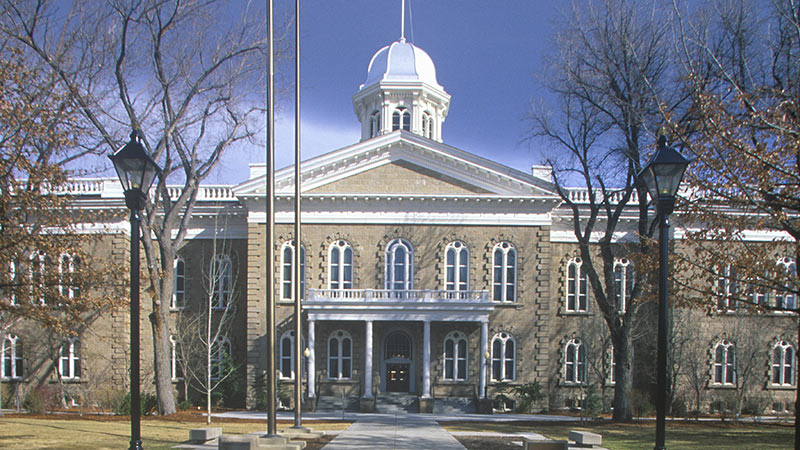December 16, 2020

Nevada is the “most improved state” for energy efficiency in 2020, according to a new report released today by the American Council for an Energy Efficient Economy (ACEEE). Nevada now ranks 21st in the country for its energy-saving initiatives, having moved up five positions over last year.
The annual scorecard measures states’ progress on a variety of energy efficiency efforts, including utility programs and policies, transportation policies, building energy codes, and state government initiatives. ACEEE attributes Nevada’s rise in the rankings to:
- An energy-saving standard for light bulbs, which will save Nevadans more than $85 million on their electric bills;
- Updates to state and local building energy codes that will reduce energy use in new residential and commercial buildings;
- Initial steps toward adopting Clean Car Standards; and
- Increasing energy savings from utility energy efficiency programs.
Business groups, trade associations, and environmental organizations recognized today’s announcement and called on policymakers to take immediate steps to secure Nevada’s position as the most energy efficient state in the country. They also said that Nevada has a rare window of opportunity to spur economic recovery by investing in energy efficiency.
“By taking steps to help Nevadans drive cleaner cars and install energy-saving light bulbs, our state took great strides toward energy efficiency this year,” said Dylan Sullivan, Reno-based senior scientist with NRDC (Natural Resources Defense Council). “To build on this progress in 2021, we must make it easier for Nevadans who are purchasing new water heaters, air conditioners, and other appliances to select efficient, electric options. These new programs must include specific opportunities for low-income Nevadans who can’t afford the upfront costs of these upgrades but will benefit the most from the long-term savings of reduced energy use at home.
“Given the imperative to take immediate action to combat climate change, bold state leadership is needed now more than ever,” said Paul Selberg, executive director with the Nevada Conservation League. “There is so much more that we can do, from adopting the strongest building energy codes available to upping the ambition of utility-run energy efficiency programs. Nevada should continue to invest in what has proven to work and double down on energy efficiency.”
“Now, more than ever, we need tested, proven, politically popular investments that can stimulate our economy so that we can quickly recover from the COVID-19 crisis. Energy efficiency is that investment,” said Ellen Zuckerman, utility program co-director with the Southwest Energy Efficiency Project. “It pays for itself, creates jobs, saves taxpayers money, increases wealth, helps hard hit industries, protects vulnerable populations, and positions the state to recover quickly as the economy reopens.”
“We have seen in states across the country that energy efficiency program reforms that model Nevada’s approach are the lowest cost, most predictable, and most immediate method to manage energy demand, create local jobs, and provide opportunities for small business energy efficiency entrepreneurs. Nevada’s clean energy innovations will create thousands of local, family-wage jobs that can’t be outsourced,” said Joe Cullen, director of policy and state outreach with the Building Performance Association.
“Nevada is moving in the right direction as exemplified by its recognition today by ACEEE, but there is much more that should be done to establish a clean energy future in Nevada,” said Levi Kamolnick, state director of Environment Nevada. “A large part of the state’s economy still wastes energy. Our state leaders must advance stronger policies and create the right incentives for further investment and growth, allowing Nevada to become the most efficient state in the country.”
“Major Nevada employers and companies are making energy efficiency investments because it helps them save money and keeps energy costs low,” said Alli Gold Roberts, director of state policy with Ceres. “As the State Climate Strategy made clear, energy efficiency is also an important tool to achieve Nevada’s ambitious climate goals. Stronger policies and programs can help companies and residents in the state capture a myriad of benefits—such as cost savings, improved air quality, and new local jobs.”
“Nevada has made good progress toward greater energy efficiency, and NV Energy’s commitment to exceed regulatory requirements for energy efficiency has been an important step in helping our state address the greenhouse gas emissions that drive climate change,” said Cameron Dyer, Western Resource Advocates’ Clean Energy Program staff attorney in Nevada. “As NV Energy contemplates its next integrated resource plan, an increased energy efficiency standard of at least 1.5 percent would help our state make better progress toward its climate goals while also saving ratepayers money and contributing to greater electricity reliability in times when extreme weather events due to climate change burden the grid. Expanding building electrification and efficiency must continue to ensure low-income programs maintain equity between electricity customers.”
Organizations recognizing Nevada’s achievement today include:
|
|
|
|
|
|
|
|
|
The Building Performance Association (BPA) is a 501(c)6 industry association committed to redefining the industry by supporting policies that will improve and increase the expansion of home and building performance, energy efficiency businesses, and industries. BPA is made up of more than 10,000 members who are working professionals in contracting services, weatherization, product manufacturing and distribution, program administration, building science, and nonprofits. For more information, visit www.building-performance.org.
Ceres is a sustainability nonprofit organization working with the most influential investors and companies to build leadership and drive solutions throughout the economy. For more information, visit ceres.org and follow @CeresNews.
Environment Nevada works for clean air, clean water, clean energy, wildlife and open spaces, and a livable climate. Our members across the state put grassroots support behind our research and advocacy. Environment Nevada is part of Environment America, a national network of 29 state environmental groups.
NRDC (Natural Resources Defense Council) is an international nonprofit environmental organization with more than 3 million members and online activists. Since 1970, our lawyers, scientists, and other environmental specialists have worked to protect the world’s natural resources, public health, and the environment. NRDC has offices in New York City, Washington, D.C., Los Angeles, San Francisco, Chicago, Bozeman, MT, and Beijing. Visit us at www.nrdc.org and follow us on Twitter @NRDC.
The Nevada Conservation League (NCL) is the independent political voice of Nevada’s Conservation Community. We work to maintain and enhance the natural character of Nevada and the quality of life for Nevadans through effective advocacy, the election of pro-conservation candidates and building collaboration.
The Southwest Energy Efficiency Project (SWEEP) – The Southwest Energy Efficiency Project is a public interest organization promoting greater energy efficiency in Arizona, Colorado, Nevada, New Mexico, Utah, and Wyoming. For more information, visit www.swenergy.org.
Western Resource Advocates (WRA) works to protect the West’s land, air, and water so that our communities exist in balance with nature. WRA’s team of scientists, lawyers, and economists craft and implement innovative solutions to the most complex natural resource challenges in the region. For more information, visit www.westernresourceadvocates.org and follow us on Twitter @wradv and #ProtectTheWest.
Contact
Julianne Basinger, Western Resource Advocates, julianne.basinger@westernresources.org
Ellen Zuckerman, Southwest Energy Efficiency Project, ezuckerman@swenergy.org


